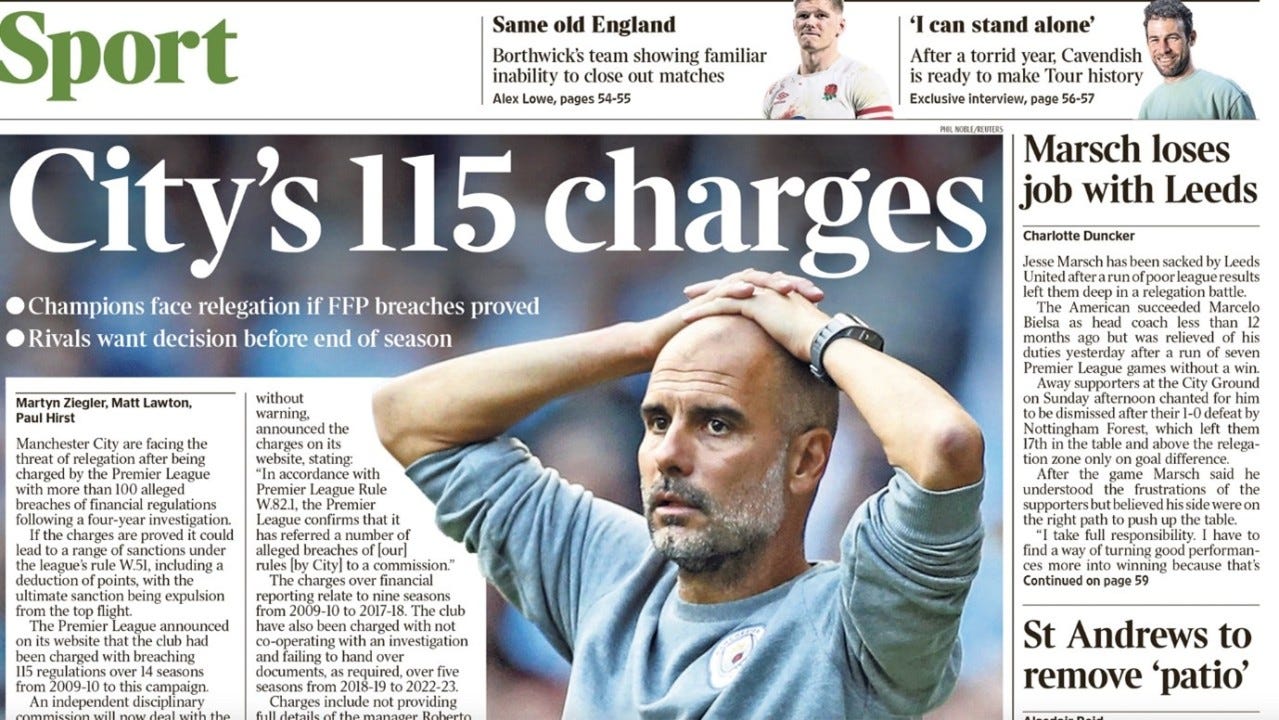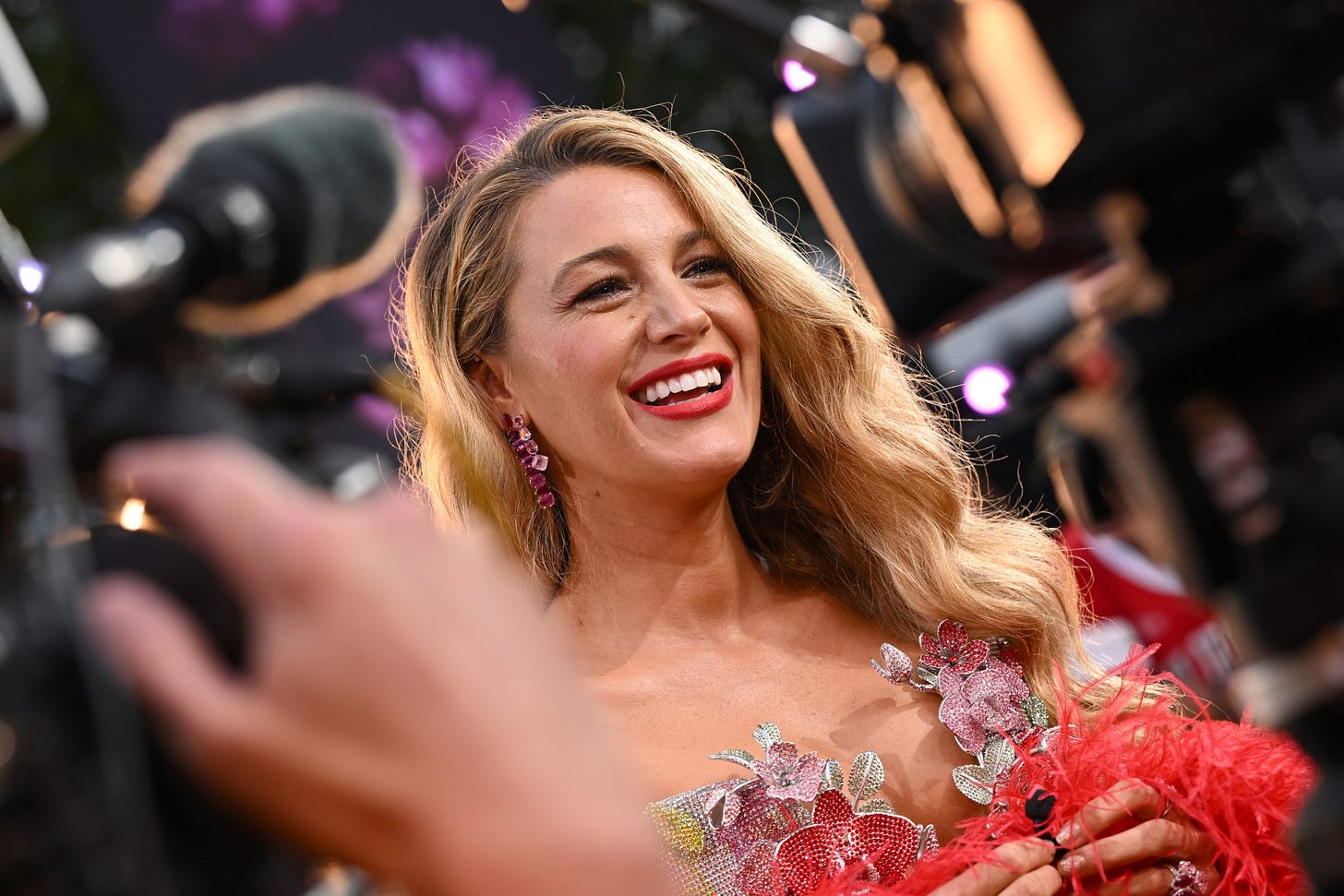Borkowski Media Trends: Premier League & Blake Lively
The Premier League returns and backlash over film promotion puts star's image in peril
Premier League’s City Limits?
The Premier League begins again tonight, although following the Euros, Copa America and the Olympics, barely enough time has passed to have felt like football was missing. But so the cycle of football goes, and in any other year this would just be any other season, except, to paraphrase Charli XCX, it isn’t. In November, the case around Manchester City’s 115 charges of financial irregularity will come to court, with a verdict set to be handed down in April. The consequences of that verdict are impossible to speculate on, given they could vary from precisely nothing to the expulsion of the club from the League system and a revocation of their multitude of titles. Any punishment will, however, reverberate through both the League and football itself.
Every week of this season is just another step towards that outcome, even as Richard Masters, the League’s managing director, tried to play it down as merely “some regulatory challenges”. Masters, and the League’s internal team, are in an unenviable position – overstate the potential impact of the case and they risk further litigation by City, but understating it plays into the hands of the already roiling sentiment of other clubs, some of whom suspect that City will get off precisely because of the PR problems punishing them poses for the League.
There is much to look forward to this season – potential rebirth at Manchester United, the new era of Arne Slot at Liverpool, plucky underdogs in Ipswich – but it feels inevitable that, as we have become accustomed to in the last four years, all will be trampled under the steamroller of the Manchester City football project and the media frenzy that surrounds it. Only time will tell what will remain at season’s end, but either way, the Premier League will not look the same in nine months time as it does right now.
Blake Lively’s PR Backfires
Blake Lively, Hollywood’s inoffensive golden girl, found this week to her PR peril that audiences are just as fickle as they’ve ever been. The release of her film It Ends With Us, an adaptation of the TikTok-powered mega-hit novel by Coleen Hoover, coincided with a backlash of nebulous origin, which spread rapidly over X. Much of the criticism seemed to stem from the idea that Lively’s PR tour for the film, a drama about domestic violence, was inappropriate, with a number of interviews including promotion of her haircare line and encouragement of fans to “wear florals” to showings of the film. Rumours of a rift between her and her co-star, and the film’s director, Justin Baldoni, have also run rampant, with a number of reports suggesting that Ryan Reynolds, Lively’s husband, rewrote many of the film’s key scenes to “save it from disaster.” Baldoni, for his part, has reportedly enlisted crisis manager Melissa Nathan.
While a headline in the Daily Mail crowed “Is Blake Lively CANCELLED?”, the situation is, predictably, a lot more nuanced than that. Lively and Reynolds occupy a rarefied space as essential fixtures in the Taylor Swift squad, and Reynolds in particular enjoys an enormous amount of public goodwill, at least in part due to his Disney series Welcome to Wrexham. Their fortunes are unlikely to be turned by social media chatter. But the last few days have indeed been testing for their brand image, with Lively’s ill-judged interviews in particular highlighting the delicate balance between being an actor and a marketeer. All good movie stars are both, but the best ones hide the grinding of the cogs far better than Lively has in recent weeks. Being sold things is off-putting at the best of times, but it is particularly so in the sensitive context of a film about domestic violence.
However, the level, and particularly the tone, of the backlash against Lively calls to mind the similar, abstract switches experienced by Anne Hathaway in 2013 and Jennifer Lawrence in 2015 – actresses who, once overexposed, were subsequently accused of being “bad vibes”, or other similarly vacant epithets, without much grounding in reality. They subsequently take some years off, before returning to great acclaim. The issues with Lively are arguably more significant than that, and certainly the renewed criticism of her choice to get married on a plantation is well overdue, but as with any star of her magnitude, a comeback is always an option when managed and judged correctly. Besides, there’s still It Starts With Us, the book’s second act, to adapt.




